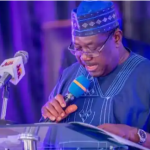Corruption is a major challenge that Nigeria has been grappling with for decades. The problem has affected every sector of the economy and has been responsible for stalling the country’s development.
Corruption in the Nigerian government is so entrenched that it has become a norm, and a way of life for many people. This article will explore how corruption has eaten deep into Nigeria’s governmental system, the causes of corruption, and what can be done to address the issue.
The Pervasiveness of Corruption in Nigeria’s Governmental System
Corruption in Nigeria’s governmental system has reached an alarming level, and it has become a major impediment to the country’s growth and development.
It is estimated that Nigeria loses about $20 billion annually to corruption (Ayodele, 2018). This is a staggering amount that could have been used to fund critical infrastructure, healthcare, and education. Corruption has permeated every facet of government, including the judiciary, police, civil service, and political institutions.
The Nigerian judiciary is one of the institutions that have been severely affected by corruption. The judiciary is supposed to be the last hope of the common man, but in Nigeria, justice can be easily bought. The system is riddled with corrupt judges who are willing to pervert the course of justice in exchange for money. This has led to a lack of trust in the judiciary, and many people have resorted to self-help as a means of resolving disputes.
The Nigerian police force is another institution that has been plagued by corruption. Police officers are known to demand bribes from motorists and pedestrians, and they are also involved in extrajudicial killings and other human rights abuses. The police have become a tool of oppression, rather than a protector of citizens’ rights.
The civil service is also a significant contributor to corruption in Nigeria. The civil service is the backbone of government, and it is responsible for implementing government policies and programs. However, corruption has eroded the efficiency of the civil service, and many civil servants are more interested in lining their pockets than in delivering quality services to the people.
Political institutions in Nigeria are also rife with corruption. Politics in Nigeria is a high-stakes game, and politicians are known to spend vast amounts of money to win elections. The funds used for election campaigns are often sourced from corrupt means, and politicians are willing to do whatever it takes to get into office, including rigging elections.
The Causes of Corruption in Nigeria’s Governmental System
Several factors have contributed to the widespread corruption in Nigeria’s governmental system. One of the primary causes of corruption is the country’s vast oil wealth. Nigeria is the largest oil producer in Africa, and the oil industry accounts for over 90% of the country’s export earnings and about 70% of government revenue. The lack of transparency in the management of oil revenue has created an environment where corruption can thrive. Oil companies have been known to bribe government officials to secure lucrative contracts, while politicians have also been implicated in using oil revenue to fund their personal lifestyles and political campaigns.
Weak Institutional Framework
Another factor that has contributed to corruption in Nigeria is the weak institutional framework. Institutions such as the judiciary, police, and civil service have been undermined by a lack of funding, politicization, and interference. This has made it difficult to hold corrupt officials accountable, as they can use their influence to manipulate the system to their advantage.
The patronage system in Nigeria has also played a significant role in fostering corruption. Political leaders often appoint their cronies to key government positions, regardless of their qualifications or experience. This has led to a situation where public officials are more concerned with serving the interests of their benefactors rather than the public.
The Impact of Corruption on Nigeria’s Governmental System
The impact of corruption on Nigeria’s governmental system has been devastating. Corruption has eroded public trust
Here are some steps that can be taken to ameliorate corruption in Nigeria:
Strengthen anti-corruption laws and institutions
Nigeria needs to have strong anti-corruption laws and institutions that can investigate, prosecute and punish corruption cases. This includes increasing the budgetary allocation to the anti-corruption agencies and providing them with the necessary resources and expertise to do their work.
Encourage transparency and accountability
Transparency and accountability are essential to combat corruption. The Nigerian government needs to be more open about its operations, finances and decision-making processes. This includes publishing information about government contracts and expenditures and holding public officials accountable for their actions.
Improve the public service
Corruption often thrives in a poorly managed and underpaid public service. Nigeria needs to invest in improving the quality of its public service, including paying public officials a fair wage, training them on ethical standards and performance management and ensuring they have the necessary resources to do their work effectively.
Promote public participation
The Nigerian government needs to promote public participation in decision-making processes and encourage civil society to monitor government activities. This includes promoting transparency and access to information, encouraging public feedback and participation in budgeting processes and creating channels for whistleblowers to report corruption.
Increase awareness and education
Education and awareness-raising campaigns can help to change public attitudes towards corruption. This includes educating citizens on the negative effects of corruption on the economy and society, promoting ethical behavior and creating a culture of integrity.
Strengthen international cooperation
Corruption is a global problem that requires international cooperation to combat effectively. Nigeria needs to work with other countries and international organizations to share information, resources and best practices to combat corruption.
These are just some of the steps that can be taken to ameliorate corruption in Nigeria. However, it will require sustained effort and commitment from the government and the society as a whole to make progress in this area.













